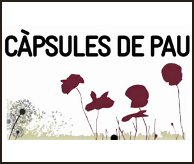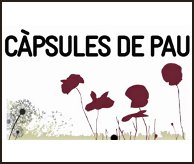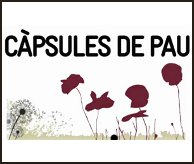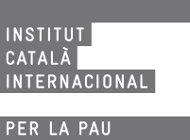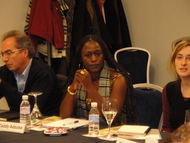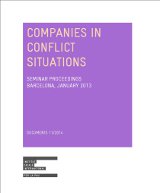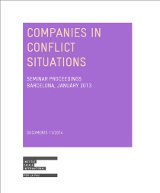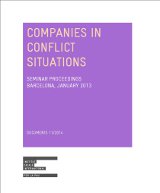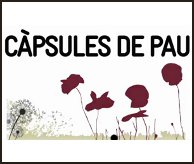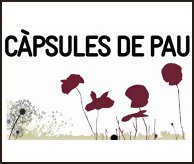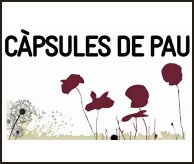The International Catalan Institute for Peace (ICIP) has announced the call for nominations for the fourth edition of the ICIP Peace in Progress Award. This prize aims to publicly recognize individuals, entities or institutions that, in an outstanding and extensive manner, have worked and contributed to the promotion and building of peace. To be considered for the award, nominations must be submitted between March 4 and June 30. If you need more information please contact ICIP by sending an email to icip@gencat.cat or by phoning 93 554 42 70.
The ICIP Peace in Progress Award consists of public recognition, a sculpture created by the Nobel Peace Prize winner, artist and activist, Adolfo Pérez Esquivel, called Porta del sol, and 4,000 euros.
The first edition of the ICIP Peace in Progress Award , corresponding to the year 2011, recognized the struggle of conscientious objectors and insubmisos (people who refuse to do military service or any substitute social work), symbolized in Pepe Beunza, first conscientious objector for ideological reasons in Spain.
In 2012, the ICIP Peace in Progress Award was granted to five “Madres de Soacha” (Mothers of Soacha) for their fight for peace and human rights in Colombia.
Last edition of the Award, in 2013, was granted to former Bosnian general Jovan Divjak, for his commitment in the defense of Sarajevo during the siege (1992-92) and for his work in favor of peace in a multiethnic society.
Before that, in October, a special edition of the award was presented to the Parliament of Catalonia for representing the continuity and legacy of the institutions Pau i Treva and Consolat de Mar.
How to send in your nomination?
Nominations must be submitted before 30 June 2014 both electronically (icip@icip.cat) and in paper format, delivering it the ICIP office (Tapineria 10, 3a planta, 08002 Barcelona, Spain), notwithstanding the provisions of Article 38.4 of Law 30/1992, of 26 November 1992, on the Legal Regime of Public Administrations and Common Administrative Procedures.
This means that nominations may, for example, be handed in and registered at Spanish post offices or at official organs of the Spanish Public Administration with “registros administrativos”, including administrative organs that belong to the General State Administration, Administration of the Autonomous Communities, Administration of the Provincial Councils, and the Local Governments.
Sending in a nomination from outside of Spain can be done by handing in and registering the documentation at one of the Diplomatic Representations of consular offices of Spain abroad or by sending it by regular mail. It should be noted, however, that if the nomination is send by mail, it will be registered with the date on which the documentation reaches the ICIP office; whereas registration at a diplomatic consular post shall be with the date of presentation at the consular office. Moreover, ICIP does not accept any responsibility in case the nomination is lost or misplaced in the mail and therefore not registered before the deadline for submitting applications.
Author: whads
What is Peace to Ricardo Saenz?
A new video of the project ‘Peace Capsules’ , coproduced by ICIP and Col·lectiu Contrast, has been published this week on the ICIP website. It is a short one minute long video entitled ‘What is Peace to Ricardo Saenz?’ and in which Saenz, anthropologist and political analyst from Guatemala, considers what peace means to him. The video is accessible both on the ICIP website and on the ICIP Youtube Channel .
Until the 21st September 2014, International Day of Peace, ICIP will publish a new video capsule each week. Each capsule will count with the participation of an activist, actor or academic who will think of what peace means to him/her. The aim of the project is to compile different approximations to the concept ‘peace’ on the ICIP web site.
What is Peace to Fredy Peccerelli?
A new video of the project ‘Peace Capsules’, coproduced by ICIP and Col•lectiu Contrast, has been published this week on the ICIP website. It is a short one minute long video entitled ‘What is Peace to Fredy Peccerelli?’ and in which Peccerelli, executive director of the Guatemalan Forensic Anthropology Foundation, considers what peace means to him. The video is accessible both on the ICIP website and on the ICIP Youtube Channel .
Until the 21st September 2014, International Day of Peace, ICIP will publish a new video capsule each week. Each capsule will count with the participation of an activist, actor or academic who will think of what peace means to him/her. The aim of the project is to compile different approximations to the concept ‘peace’ on the ICIP web site.
What is Peace to Nery Ródenas?
A new video of the project ‘Peace Capsules’, coproduced by ICIP and Col•lectiu Contrast, has been published this week on the ICIP website. It is a short one minute long video entitled ‘What is Peace to Nery Ródenas? ‘ and in which Ródenas, Executive director of Human Rights Office from Guatemala’s Bishop (ODHAG) considers what peace means to him. The video is accessible both on the ICIP website and on the ICIP Youtube Channel .
Until the 21st September 2014, International Day of Peace, ICIP will publish a new video capsule each week. Each capsule will count with the participation of an activist, actor or academic who will think of what peace means to him/her. The aim of the project is to compile different approximations to the concept ‘peace’ on the ICIP web site.
ICIP Declaration on the Right to Decide and the 9N Process
The International Catalan Institute for Peace (ICIP) was created by the Parliament of Catalonia in 2007, as an independent public entity, in order to “promote a culture of peace in the society of Catalonia and at the international level,” according to Article 1 of the Law by which it was established.
Since July 2009, when it commenced its public activities, ICIP has carried out this objective both here and abroad, and has focused on peacebuilding based on three major components: a) tools of conflict analysis; b) activities and tools to favor dialog, consensus and peaceful and constructive conflict management; and c) efforts to activate, in a nonviolent manner, the collective action of societies. Democracy plays an essential role in all three components, in the inseparable dimensions on which it is based and is practiced in every society and state governed by the rule of law: deliberative, participatory and representative.
For all these reasons, ICIP feels bound to pronounce on the Right to Decide and its relationship with peacebuilding, once the Central Government has decided to challenge the new call for the process of November 9, now presented as a citizen participation process without any legal consequences.
The exercise of the Right to Decide has become a key element to ensure peace and coexistence in Catalonia, and ICIP wishes to state that:
1. Although the new challenge by the Spanish Government is a legal action justified by the “preservation of democracy and its guarantees,” it is a mistake and a fallacy. The call for the 9N process intends to allow a heterogeneous group of people to exercise their right to freedom of expression and demonstration, which every democracy should protect and promote, in order to express their opinion, based on local self-governance legislation and without any legal effect. This would provide an outlet to processes of collective action on the part of a significant majority of Catalan society. The challenge is a mistake because it prohibits, in the name of democracy, one of its key elements: participation and freedom of expression. And it is absurd to place the focus on the legal arena rather than on the political one since this aggravates a situation of conflict and distances us from dialog and the constructive search for solutions.
2. ICIP’s peacebuilding experience compels us to insist on the need to face conflicts, analyzing them and looking for political solutions through open dialog and the search for mutually acceptable solutions in the short, medium, and long term. Legal procedures and tools are the basis for results in negotiations, but they can never take the place of collective action in favor of the common good or political dialog between parties. When one party in a conflict considers itself to be a political actor, with significant social and parliamentary support, it must be accepted as one in order to ensure successful negotiations.
3. The consultation of Catalan society on its collective political future, understood as part of a deliberative process and with total respect for diversity and plurality, continues to be inevitable. It is and will be part of the solution to the conflict, and not part of the problem, as demonstrated by the immense majority of Catalan society that wishes to be consulted. It is therefore necessary to find a way to know what Catalan society wants regarding its collective political future, and it must be done by seeking, yet again, understanding and dialog in Catalonia and with the Central Government – and quickly. We have already reached the point in conflicts when the passage of time complicates, aggravates and polarizes, and is unlikely to help reach a peaceful and constructive solution.
4. On November 9, Catalan society will express its commitment to the Right to Decide and its rejection of prohibitions and the lack of negotiated solutions. ICIP, as part of Catalan society and as an institution, supports the 9N process.
5.The prospect of a formula that allows the citizenry of Catalonia to democratically state, with every guarantee, how they view their collective future compels us to recall that we must ensure, especially now, that the process continue to be peaceful, civic and unequivocally nonviolent, and with total respect for the right to diversity and freedom of expression of all opinions.
In this respect, we find it useful to recall a lucid reflection by Lluís Maria Xirinacs – a pacifist and pro-independence supporter at a time when both things were socially in the minority – which can help to avoid provocations: Fight against those who are strong when we are weak and against ourselves when we are strong.
4 November 2014
ICIP congratulates Caddy Adzuba
The International Catalan Institute for Peace welcomes the recognition received by Congolese journalist Caddy Adzuba, on whom the Prince of Asturias Award for Concord has been bestowed. Adzuba, an activist for freedom of the press and for the rights of women and girls, has been honored as “a symbol of the peaceful struggle against the violence suffered by women, poverty and discrimination, through her perilous and generous work.”
The journalist, a founding member of “A loudspeaker for the silence” network, participated in a seminar organized by ICIP on January 21, 2010 entitled “The problems with information about sexual violence against women in armed conflicts,” which focused on the case of the Congolese region of Kivu.
‘Companies in Conflict Situations’
‘Companies in Conflict Situations’
‘Companies in Conflict Situations’
What is Peace to Marina Gallego?
A new video of the project ‘Peace Capsules’ , coproduced by ICIP and Col·lectiu Contrast, has been published this week on the ICIP website. It is a short one minute long video entitled ‘What is Peace to Marina Gallego?’ and in which Gallego, member of the Ruta Pacífica de las Mujeres of Colombia, considers what peace means to her. The video is accessible both on the ICIP website and on the ICIP Youtube Channel .
Until the 21st September 2014, International Day of Peace, ICIP will publish a new video capsule each week. Each capsule will count with the participation of an activist, actor or academic who will think of what peace means to him/her. The aim of the project is to compile different approximations to the concept ‘peace’ on the ICIP website.
What is Peace to Mabel Cañada?
A new video of the project ‘Peace Capsules’ , coproduced by ICIP and Col·lectiu Contrast, has been published this week on the ICIP website. It is a short one minute long video entitled ‘What is Peace to Mabel Cañada?’, and in which Cañada, activist from the Basque Country and co-founder of the Lakabe eco-village, considers what peace means to her. The video is accessible both on the ICIP website and on the ICIP Youtube Channel .
Until the 21st September 2014, International Day of Peace, ICIP will publish a new video capsule each week. Each capsule will count with the participation of an activist, actor or academic who will think of what peace means to him/her. The aim of the project is to compile different approximations to the concept ‘peace’ on the ICIP website.
What is Peace to Mabel Cañada?
A new video of the project ‘Peace Capsules’ , coproduced by ICIP and Col·lectiu Contrast, has been published this week on the ICIP website. It is a short one minute long video entitled ‘What is Peace to Mabel Cañada?’, and in which Cañada, activist from the Basque Country and co-founder of the Lakabe eco-village, considers what peace means to her. The video is accessible both on the ICIP website and on the ICIP Youtube Channel .
Until the 21st September 2014, International Day of Peace, ICIP will publish a new video capsule each week. Each capsule will count with the participation of an activist, actor or academic who will think of what peace means to him/her. The aim of the project is to compile different approximations to the concept ‘peace’ on the ICIP website.


